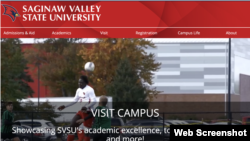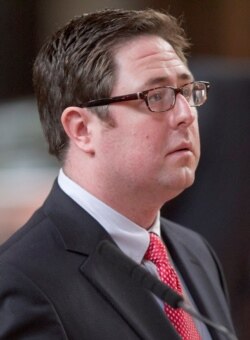Student Union
Court Filing Shows 11-3 Big Ten Vote to Postpone Football Season

A court filing disclosed Monday shows Big Ten Conference presidents voted 11-3 to postpone the football season, bringing some clarity to a key question raised in a lawsuit brought by a group of Nebraska football players.
The vote breakdown was revealed in the Big Ten's response to the lawsuit.
The court documents did not identify how each school voted, but a person familiar with the outcome told The Associated Press that Iowa, Nebraska and Ohio State voted against postponing the fall football season. The person spoke on condition of anonymity because the Big Ten was not planning on making the specifics of its vote public.
The Big Ten announced Aug. 11 it would move its football season from fall to spring semester because of health risks associated with the coronavirus pandemic. The Pac-12 followed suit, joining the Mid-American Conference and the Mountain West.
The eight football players are seeking the reinstatement of a fall season.
"The Big Ten Conference continues to share the disappointment that student-athletes and families are feeling," the conference said in a statement. "The Big Ten Return to Competition Task Force will continue to be transparent as it actively considers options to get back to competition when it is safe to play."
The lawsuit in Lancaster County District Court contends, among other things, that the players are losing a chance for development, exposure for a possible pro career and won't be able to market themselves to eventually capitalize on name, image and likeness revenue opportunities.
The Big Ten filing was a response in opposition to the players' motion for expedited discovery. The filing said the 11-3 vote "far exceeded" the 60% threshold the Big Ten requires. The filing also said the Big Ten based its decision on multiple factors, including the medical advice and counsel of the Big Ten Task Force for Emerging Infectious Diseases and the Big Ten Sports Medicine Committee.
Listed as plaintiffs are Brant and Brig Banks, Alante Brown, Noa Pola-Gates, Jackson Hannah, Garrett Nelson, Ethan Piper and Garrett Snodgrass.
The players' attorney, Mike Flood, declined immediate comment, saying he needed to read the filing.
Flood, a former speaker of the Nebraska Legislature, owns five radio stations that broadcast Cornhuskers football games as part of the Husker Sports Network.
The lawsuit says the Big Ten's decision-making process was "flawed and ambiguous" and called into question whether the league's Council of Presidents and Chancellors formally voted on the decision. The medical studies used to make the decision, the lawsuit says, were not relevant to the circumstances of college-age athletes and did not take into account school safety measures.
"This decision did not occur in a vacuum," the conference said in its filing.
The decision not to play fall football has created a firestorm in Big Ten country, fanned by the fact the ACC, Big 12 and SEC are pushing ahead with plans to start their seasons in September.
Commissioner Kevin Warren has faced sharp criticism for not clearly laying out how the decision was reached. He has sidestepped questions about the vote breakdown, and his explanations of the medical reasons were panned for not being detailed enough.
A group of Nebraska player parents have been most vocal in demanding answers from the commissioner, and parents from other Big Ten schools joined them.
The Big Ten said last week the lawsuit "has no merit and we will defend the decision to protect all student-athletes as we navigate through this global pandemic. We are actively considering options to get back to competition and look forward to doing so when it is safe to play."
Flood, in his role representing the Nebraska player parents, previously sent a letter to Warren asking for documents relating to any votes taken, how each school voted, meeting minutes and all audio and video recordings and transcripts of meetings where votes were cast. He also wanted copies of studies, scientific data and medical information or advice considered by the presidents.
Flood had threatened a federal lawsuit if the materials weren't delivered to him. The Big Ten did not respond to the letter.
See all News Updates of the Day
International students navigate financial challenges to pay US tuition

Navigating the complexities of higher education is challenging for many, but for international students, the financial hurdles can be particularly daunting.
Faced with skyrocketing tuition and fees, limited access to financial aid, and the instability of scholarships, many international students struggle to sustain their academic dreams.
Funding problems can lead some students to withdraw their college applications, as Alpha Daramy Sesay of Sierra Leone did. He abandoned his dream of studying journalism at the University of Maryland.
"I've applied to almost three universities in the past two years, and the board members were thrilled with my purpose statement and approved my application unambiguously," Sesay told VOA News. "However, I was unable to register due to the funding bottleneck, and the deadline for these offers has just lapsed."
Sesay had meticulously planned his move to the U.S., even stopping his scholarship search when a family member promised financial support. When Sesay was admitted to his dream school, however, the family support fell through, leaving him scrambling for scholarships that didn't cover all expenses.
Reflecting on his ordeal, Sesay advises future international students to seek scholarships and consult with school advisers early to avoid similar setbacks.
Talia Popovski, senior director of International Student Services at Valencia College in Orlando, Florida, suggests starting at a community college to save on tuition costs.
"Primarily, we have international students pursuing associate degrees," she said. "This is a major way for them to save money compared to going directly to a university."
Popovski emphasized the benefits of community colleges as pathways to universities, with many international students pursuing associate degrees before transferring to earn their bachelor's degrees. She also highlighted the role of on-campus work in alleviating financial burdens, suggesting institutional work-study programs as options.
According to NAFSA: Association of International Educators, a nonprofit dedicated to international education and exchange, international students are ineligible for federal work-study positions, necessitating discussions with advisers about employment eligibility. Popovski also mentioned that universities offer part-time jobs through their human resources departments, including paid internships, which provide additional financial support for education.
Student secures honor scholarship
Guilherme Lucas Mannarino, who received his associate degree from Valencia College, turned down 32 esports scholarships to study in Florida.
"I came to the United States [from Brazil] when I was 18 years old," Mannarino recalled. "I rejected all the scholarships that I acquired through esports, playing Fortnite."
Mannarino, who majored in finance at Valencia College, exemplified proactive planning in overcoming financial challenges.
Despite declining the esports scholarships, Mannarino secured an honor scholarship at Valencia College covering 50% of his tuition. He attributed his financial stability to planning ahead, staying on top of his academics, and acquiring an on-campus job.
To supplement his income, he conducted workshops advising Brazilian students on esports scholarships, allowing him to cover living expenses by finding roommates through social media.
"I was able to find a roommate on social media before coming to the U.S., which is a great way to save money," he said. "A year later, we had another roommate, which made my living costs cheaper, which is honestly the best way to save money in the U.S."
Tips for overcoming financial hurdles
Kadiatou Sow, from Conakry, Guinea, is studying at Saginaw Valley State University in University Center, Michigan.
"Managing the high cost of tuition and living expenses while studying abroad involves a strategic approach," Sow said. "I prioritize securing scholarships and grants tailored for international students to alleviate tuition expenses and sometimes cover living costs. Supplementing this with part-time work both on campus and in the local community provides a steady income for daily necessities."
She encourages fellow international students to balance work and studies effectively, understand visa work-hour regulations, and seek university support for financial aid options.
"Seeking guidance from university support services and staying informed about financial aid options are essential strategies for navigating these challenges successfully," Sow said.
Three ways international students can overcome financial hurdles:
1. Community college enrollment: Begin with an associate degree at a community college to save significantly on tuition costs before transferring to a university for a bachelor's degree.
2. On-campus employment: Explore institutional work-study programs and university job boards for part-time employment opportunities that complement studies and provide financial support.
3. Proactive financial planning: Save money before arriving in the U.S., seek scholarships tailored for international students, and explore paid internship opportunities to supplement income.
While financial obstacles are daunting, international students can achieve their academic aspirations through strategic planning, diligent scholarship pursuit and leveraging on-campus resources, advisers say.
By adopting proactive financial strategies and staying resilient, they can successfully navigate the challenges of financing their education abroad, ensuring a path to academic success and personal growth.
- By VOA News
Indian newspaper offers tips for US-bound students

Telangana Today, a newspaper in India, offers a list of tips and resources for students planning to study in the United States.
Among them:
- Prepare for your travel to the U.S., making sure to gather all necessary documents, including your passport and visa.
- Be sure to attend orientations.
- By VOA News
Michigan State international students get their own space

Michigan State University in East Lansing, Michigan, is setting aside a space in the International Center for international students.
Nidal Dajani, vice president of the school's International Student Association, said that the club plans to use the space to host events and hopes to collaborate with other student groups.
- By Dylan Ebs
International students find community during Pride Month

For LGBTQ+ international students, Pride Month, observed in June, is a unique time to reflect.
They hold on to multiple identities — both their LGBTQ+ identity and their cultural background — but coming to terms with them is not always easy.
For graduate student David Zhou, these identities can feel conflicting as transgender rights in China remain a controversial issue and spaces for LGBTQ people close. Zhou, 25, is transgender and pursuing an education in the STEM field at an urban university in the Midwestern United States.
VOA is using a pseudonym for Zhou’s first name and is not naming his university to protect his identity due to safety concerns back home in China. Zhou is not open about his transgender identity to his family.
During Pride Month, Zhou said he attended multiple LGBTQ+ events in his community and is surrounded by a supportive group of LGBTQ+ students who can relate to his experiences. But he’s not open about his identity to everyone on campus and said he doesn’t disclose his preferred pronouns to everyone to avoid transphobic comments.
“I feel like I have to make some judgments of the character of that person to see if they’re a good person to disclose [my identity] to,” Zhou said.
Zhou’s Pride Month celebrations included attending local markets with LGBTQ+ vendors and hanging out with his LGBTQ+ friends.
“They normalized being trans and for a long time I feel like trans identity is, should I say a vulnerability, brings me fear and worrying about discrimination, but having those events are helpful because it allowed me to see that queer people could just [live] openly,” he said.
At social events where few international students are present, Zhou said it can be tough to fit in.
“There's a lot of times like when they were talking about things I kind of, don't really understand, mostly because I kind of lack some background experience or knowledge,” he said.
Zhou said he is not aware of specific groups for LGBTQ+ international students at his university, but said international students are more prevalent in graduate programs and therefore find representation in organizations for LGBTQ+ graduate students.
In China, transgender individuals must obtain consent from an “immediate family member,” even for adults hoping to transition, which critics say limits the autonomy of transgender individuals while supporters say the policy protects doctors from violence by upset parents.
Struby Struble, a former coordinator of the University of Missouri LGBTQ+ Resource Center, told NAFSA: Association of International Educators in 2015 that LGBTQ+ international students face a “double barrier” on campus.
“With their international student friends, they feel isolated because they’re the LGBT one,” she said. “But then among the LGBT students on campus, they feel isolated because they’re the international one.”
Nick Martin, associate director of the Q Center, Binghamton University’s LGBTQ+ student support office, said when international students tour the center, there’s often a sense of hesitation as they enter a type of space that may not be present in their home country.
“I compare that to a year in after they've come into the space, they've again, maybe come to some of our events, they've got more connected,” he said.
Martin said graduate students have a unique interest in the Q Center as they may use the office for research and advocacy purposes that align with their studies.
“For older students, there may be hesitancy in a different way, but I think it's more in the vein of they want to do some of the advocacy work,” he said.
Martin said he thinks about how both his office and BU’s international student office can support students who come from countries with few — if any — protections for LGBTQ+ individuals.
“It's been a learning process of what those students really need, but I think I've kind of learned that a lot of students are just looking for the safe space that we offer,” Martin said.
- By VOA News
International students discuss US campus culture shock

International students at De Anza College in Cupertino, California, talked about culture shock in an article in La Voz News, the student newspaper.
"It felt like a major culture shock. Everything was so different, from academics to mannerism," said a student from Mexico.
Read the full story here.








